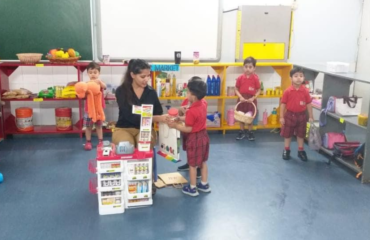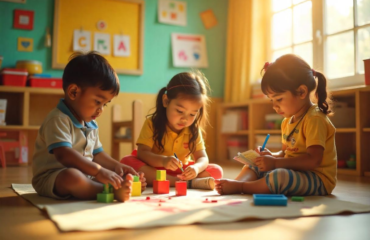
It is impossible to overestimate the significance of early childhood care and education (ECCE) in the vibrant and varied landscapes of India, where each child’s laugh and dream contribute to the vitality of the country. This formative period shapes a child’s future potential and well-being in addition to determining the course of their scholastic career. It is not only advantageous but also essential to prioritise early childhood education as India works to become a knowledge superpower. Let’s explore how Little Scholar is shaping the future of our generation.
Significance of Early Childhood Education
The importance of Early Childhood Care and Education (ECCE) in India is growing due to its ability to provide a solid basis for a young child’s overall development. It is envisioned as an integrated programme for kids from the prenatal stage to age eight that takes a life cycle approach to meet kids’ needs for care, education, nutrition, and overall health.
Given the incredibly fast pace of development throughout the first six years of life, these years are widely seen as the most crucial for a child’s lifetime development. For the brain’s early synaptic connections to form and for the brain to reach its full potential, a child’s early experiences and mental stimulation are critical. Many young children receive subpar care during their formative years, which can cause lifelong developmental delays and deficiencies.
Major Objectives of Early Childhood Education
Two major objectives of early childhood education are given below:
- To foster children’s whole development—physical, social, emotional, artistic, linguistic, and cognitive—employing an age- and developmentally-appropriate play-based programme of activities and interactions that might give them a head start on lifetime learning and development;
- The goal is to help kids become ready for school by providing them with play-based, cognitive, and language-related experiences and activities that will help them develop the skills and concepts necessary to acquire the three Rs—reading, writing, and math—before they enter primary school.
Stages of Early Childhood Education
Three major stages can be distinguished in the early years:
- A time is known as “infant-toddler” for kids under three who need proper dietary and health inputs, as well as protective, consistent, and responsive care from their families or daycare centres;
- A preschool or centre-based pre-primary education programme is necessary for children aged 3 to 6 who are enrolled in the Early Childhood Education (ECE) stage, which is sometimes referred to as the Preschool/Pre-Primary School Education stage;
- The Early Primary level is intended for children aged six to eight. Since they share developmental traits with younger children, children between the ages of six and eight are still classified as being in the Early Childhood stage even though they should be in primary school. With the large dropout rates in the early primary grades, the seamless transfer of young kids from preschool to school becomes a top issue. Nutrition, care, and health support—along with the instructional content—remain crucial inputs at each of these substages.
Early Childhood Education Through Little Scholar
Below mentioned are the programs offered by the Little Scholar:
| Programs | Age |
| Mother’s Toddlers | 1 yr to 1.5 yrs |
| Scholar’s Toddlers | 1.5 yrs to 2 yrs |
| Scholar’s Playgroup | 2 yrs to 2.5 yrs |
| Scholar’s Pre Nursery | 2.5 yrs to 3 yrs |
| Scholar’s Nursery | 3 yrs to 4 yrs |
| Scholar’s Kindergarten | 4 yrs to 5 yrs |
How is Little Scholar Offering Early Childhood Education?
- Little Scholar offers a curriculum that is learner-centred and works to enhance the development and achievement domains. The activities are designed with the general development of young children in mind, and the curriculum establishes a strong link between the theoretical and practical components.
- Preschool multi-media education was first introduced in Noida twenty years ago by the Little Scholar School. It provides intelligent instruction to your kids so they’re prepared for the upcoming wave of technology innovations. It helps your toddler learn through science and tech-based activities.
- Learning activities for kids like Kids create everything from paper boats to compete in sports, doll haircuts to cooking delectable dishes, colorful paintings to win annual days, and much more.
It is crucial to remember that learning at this young age should not be formal and academic; rather, it should be guided by the child’s interests and developmental goals and relevant to her family and social environment. Regretfully, research on early childhood education programmes across the nation has shown that academic instruction is primarily taught at this level, which is unmistakably a downward extension of the primary curriculum. This can be detrimental to the children since they are not yet developmentally or academically ready for this curriculum.
FAQs
What are the benefits of early childhood care and education?
- Socialisation: Early childhood is the only time when socialisation may truly begin.
- Expand brain capacity: Learning occurs in the early years of life.
- Understanding through enjoyable, activity-based learning:
- To cultivate confidence and self-worth
- Develop value education
What are the aims of early childhood care and education?
The goal of ECCE is the child’s overall development, including their moral, cognitive, linguistic, affective, emotional, and physical growth. It’s crucial to remember that preschool attendance is not a guarantee of improved academic performance.
What is the need and importance of early childhood care and education in India?
From the time of pregnancy to age six, Early Childhood Care and Education (ECCE) has a significant impact on how children grow holistically. The early years are crucial for instilling values and skills, as acknowledged by India’s cultural legacy.





